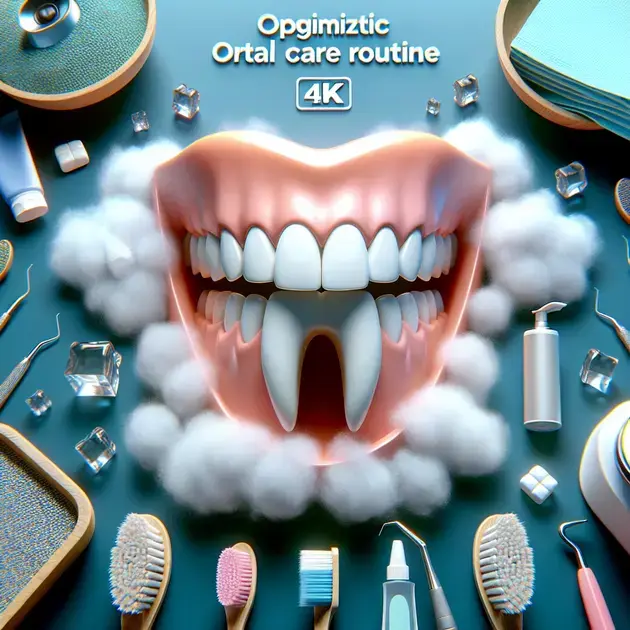Improving oral health and hygiene is crucial for maintaining a confident smile and overall well-being. Good oral hygiene not only keeps your teeth and gums healthy but also contributes to your overall health.
With regular dental check-ups, proper brushing and flossing techniques, as well as a balanced diet, you can significantly improve your oral health and achieve a bright, healthy smile. In this post, we will discuss essential tips to help you enhance your oral hygiene routine for optimal dental care.
Essential Dental Tips for a Healthy Smile
Having a healthy smile is essential for overall well-being. To achieve and maintain good oral health, follow these essential dental tips:
1. Brush and Floss Regularly
Brushing your teeth at least twice a day and flossing daily are crucial steps in maintaining a healthy smile. Use a fluoride toothpaste and a soft-bristled toothbrush to gently clean all surfaces of your teeth and along the gumline. For effective flossing, gently guide the floss between your teeth and curve it around each tooth to remove plaque and debris.
2. Visit Your Dentist Twice a Year
Regular dental check-ups are vital for detecting and preventing oral health issues. Schedule appointments with your dentist at least twice a year for professional cleanings, examinations, and screenings. Your dentist can identify early signs of dental problems and provide personalized care.
3. Maintain a Balanced Diet
Eating a balanced diet rich in fruits, vegetables, lean proteins, and dairy products can benefit your oral health. Limit sugary and acidic foods and drinks that can contribute to tooth decay and gum disease. Drinking plenty of water can also help wash away food particles and bacteria.
4. Avoid Tobacco and Excessive Alcohol
Smoking and using tobacco products can have detrimental effects on your oral health, leading to gum disease, tooth loss, and oral cancer. Similarly, excessive alcohol consumption can contribute to dry mouth and an increased risk of oral infections. Quitting tobacco and moderating alcohol intake can improve your dental health.
5. Protect Your Teeth During Physical Activities
If you participate in sports or activities that pose a risk of dental injury, such as contact sports, wear a mouthguard to protect your teeth and gums. A custom-fitted mouthguard from your dentist offers the best protection against dental trauma.
Improving Your Oral Health with Regular Dental Check-ups
Scheduling regular dental check-ups is vital for improving your oral health and preventing potential issues. Follow these steps to make the most of your dental appointments:
1. Find a Reputable Dentist
Search for a reputable dentist in your area through websites like American Dental Association (ADA) or ask for recommendations from friends and family. Choose a dentist who makes you feel comfortable and offers comprehensive dental care.
2. Prepare for Your Appointment
Prior to your dental visit, make a list of any concerns or symptoms you have regarding your oral health. Bring your insurance information, medical history, and a list of medications you are currently taking. This information will help your dentist provide appropriate care.
3. Discuss Your Oral Health Goals
During your dental check-up, communicate openly with your dentist about your oral health goals and any changes you’ve noticed in your teeth or gums. Your dentist can tailor their recommendations and treatment plan to help you achieve a healthier smile.
4. Follow Recommendations for Treatment
If your dentist identifies any issues during the exam, follow their recommendations for treatment and follow-up care. This may include professional cleanings, restorative procedures, or specialized treatments to address specific oral health concerns.
5. Practice Good Oral Hygiene at Home
Between dental appointments, maintain a consistent oral hygiene routine at home by brushing, flossing, and using mouthwash daily. Your dentist can provide guidance on proper techniques and recommend oral care products that meet your individual needs.
Optimizing Your Oral Hygiene Routine for Better Dental Care
Optimizing your oral hygiene routine is crucial for maintaining optimal dental health. Follow these tips to enhance your oral care practices:
1. Use the Right Tools
Choose a toothbrush with soft bristles and a comfortable grip to effectively clean your teeth without causing damage to your gums. Consider using an electric toothbrush for thorough plaque removal. Select dental floss or interdental brushes that fit comfortably between your teeth.
2. Establish a Routine
Create a consistent oral hygiene routine that includes brushing your teeth for two minutes twice a day and flossing at least once a day. Set reminders on your smartphone or use toothbrush apps like Brush DJ or Oral-B to track your brushing time and ensure proper oral care.
3. Rinse with Mouthwash
Incorporate mouthwash into your oral hygiene routine to freshen your breath, reduce plaque, and protect against gum disease. Choose an alcohol-free mouthwash with fluoride to strengthen enamel and prevent cavities. Use mouthwash after brushing and flossing for comprehensive oral care.
4. Monitor Your Oral Health Progress
Prioritize regular dental visits to monitor your progress and address any concerns with your oral health. Keep track of any changes in your teeth or gums, such as sensitivity, bleeding, or discoloration, and promptly inform your dentist for evaluation and treatment.
5. Stay Informed About Oral Health
Stay informed about the latest developments in oral health care by reading reputable sources such as the Colgate Oral Care Center or following dental professionals on social media platforms. Educating yourself about oral hygiene techniques and advancements can help you optimize your dental care routine.
Regular Flossing Techniques for Oral Health Maintenance
Flossing is a crucial part of maintaining good oral health. By removing plaque and food particles between teeth, flossing helps prevent cavities, gum disease, and bad breath. Here is a step-by-step guide on how to floss correctly:
Step 1: Choose the right floss
There are different types of floss available, such as waxed, unwaxed, flavored, and tape floss. Choose one that feels most comfortable for you to use.
Step 2: Use enough floss
Break off about 18 inches of floss and wind most of it around one of your middle fingers. Wind the remaining floss around the same finger of the opposite hand.
Step 3: Hold the floss correctly
Hold the floss tightly between your thumbs and forefingers and gently insert it between your teeth. Be careful not to snap or force the floss as this can harm your gums.
Step 4: Curve the floss
Curve the floss into a ‘C’ shape around each tooth and move it up and down to remove plaque and debris. Make sure to floss below the gumline as well.
Step 5: Use a clean section for each tooth
As you move from tooth to tooth, unravel a clean section of floss and continue the process. Remember to floss behind your back teeth as well.
Healthy Dietary Habits for Strong Teeth and Gums
Eating a healthy diet plays a significant role in maintaining strong teeth and gums. Incorporating foods rich in essential nutrients can help prevent tooth decay and gum disease. Here are some dietary habits to promote oral health:
Step 1: Consume calcium-rich foods
Calcium is essential for strong teeth. Include dairy products, leafy greens, almonds, and soy products in your diet to ensure an adequate intake of calcium.
Step 2: Eat foods high in vitamin C
Vitamin C is crucial for gum health. Citrus fruits, strawberries, bell peppers, and tomatoes are excellent sources of vitamin C that can help strengthen gums.
Step 3: Avoid sugary and acidic foods
Sugary and acidic foods can erode tooth enamel and lead to cavities. Limit your consumption of candies, sodas, and citrus fruits to protect your teeth.
Step 4: Stay hydrated
Drinking an adequate amount of water throughout the day helps wash away food particles and bacteria that can cause tooth decay. Opt for water over sugary beverages.
Step 5: Incorporate crunchy fruits and vegetables
Fruits and vegetables like apples, carrots, and celery act as natural toothbrushes, stimulating saliva production and helping clean teeth naturally.
The Importance of Using Fluoride in Your Oral Care Routine
Fluoride is a key ingredient in maintaining good oral health as it helps strengthen tooth enamel and prevent tooth decay. Including fluoride in your oral care routine is essential for healthy teeth and gums. Here are some reasons why fluoride is crucial:
Step 1: Strengthens tooth enamel
Fluoride remineralizes weakened tooth enamel, making it more resistant to acid attacks that can lead to cavities. This helps maintain strong and healthy teeth.
Step 2: Prevents cavities
Fluoride inhibits the growth of harmful bacteria in the mouth and slows down the progression of tooth decay. Regular use of fluoride can reduce the risk of cavities.
Step 3: Supports overall oral health
Fluoride not only benefits teeth but also helps maintain healthy gums. It contributes to a well-rounded oral care routine that promotes optimal oral health.
Step 4: Available in various forms
Fluoride is commonly found in toothpaste, mouthwash, and professional fluoride treatments. Choose oral care products that contain fluoride to reap its benefits.
Step 5: Recommended by dental professionals
Dentists often recommend the use of fluoride for both children and adults to strengthen teeth and prevent dental problems. Incorporating fluoride into your daily oral care routine can lead to better oral health outcomes.
Conclusion
Regular flossing, healthy dietary habits, and the use of fluoride are essential components of a comprehensive oral care routine. Flossing correctly helps remove plaque and debris, preventing cavities, gum disease, and bad breath. Choosing the right floss, using enough floss, and holding it correctly are key steps to ensure effective flossing.
Healthy dietary habits contribute significantly to strong teeth and gums. Consuming calcium-rich foods, foods high in vitamin C, and avoiding sugary and acidic foods can promote oral health. Staying hydrated and incorporating crunchy fruits and vegetables also aid in maintaining optimal oral hygiene.
Furthermore, incorporating fluoride into your oral care routine is vital for maintaining good oral health. Fluoride strengthens tooth enamel, prevents cavities, and supports overall oral health, recommended by dental professionals. With the availability of fluoride in various forms like toothpaste and mouthwash, integrating fluoride into your daily routine can lead to improved oral health outcomes.

